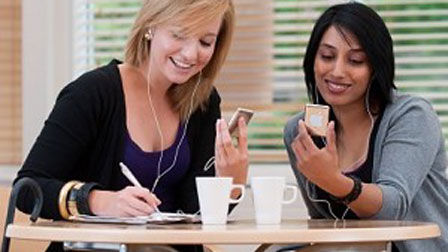University News Last updated 27 May 2010

Students at Birmingham City University are the first in the country to be given iPhones to help them learn outside of the lecture theatre.
The University’s Faculty of Technology, Engineering and the Environment (TEE) has teamed up with O2 to provide more than 100 staff and Masters student with the Apple iPhones so they can access and send information about courses and their studies without the need for a computer.
To make learning truly portable staff and students will be able to use their smart phones to access an application (app) called iCity, which has been produced by the University’s Corporate ICT team. Normally only available on a PC or laptop, iCity is a gateway to learning which allows members of the University to access a wide range of information – from details about learning resources, and communicating with teaching staff to information about social and cultural events organised by the university. Nominated for the 2010 Times Higher Education (THE) leadership award, iCity is designed to suit all electronic media platforms and environments and is particularly focused on the expanding needs of mobile communications.
Always seeking to innovate, Birmingham City University sees mobile teaching and learning methods as a key element of a comprehensive converged learning strategy that will help meet the needs of 21st Century students. Smart devices, such as the iPhone, will give students the freedom to learn anywhere, any time.
The pilot will be assessed by the University’s ICT team and the Faculty’s School of Computing, Telecommunications and Networks (CTN) to test the value of mobile communications as a key element of converged learning. The project is expected to benefit not only teaching and learning, but also applied research and the development of external projects with partner organisations of every size and type.
Associate Dean for the Faculty, Dr Peter Rayson, says: “Birmingham City University is constantly seeking to innovate and is keen to explore how technology can enhance the teaching and learning experience. This project also enables us to trial the effectiveness of our iCity intranet for students and staff, on a smart-phone platform. As the UK’s first university to tackle this approach, we’re delighted to be working with O2. The project will reveal just how effectively we can use converging technologies to advance student teaching in a dynamic modern context, whilst also informing O2 as to how best to develop its services for students and other learners.”
Zoe Frost, O2’s Head of Vertical Marketing, commented: “We’ve been building a strong relationship with Birmingham City University over the last year, across a number of departments, and are delighted we’re now ready to launch this programme. Finding new and innovative ways for people to learn is extremely important. Through this pilot we hope to gain valuable insights into ways in which both students and teachers use handheld learning devices.”
The CTN school’s extensive telecoms expertise significantly benefits its co-ordination of the project, as does its closeness to its three sister technology schools. Many of their courses and projects involve staff and students engaging externally with industry and business in areas such as engineering, construction and media. Use of mobile technologies will offer flexibility, both in communicating key course information and in supporting students and staff with project-related data and information, regardless of location. Relevant off-campus activities can continue uninterrupted, whilst information can be exchanged to the benefit of both students and the client organisations with whom they and University staff are collaborating.
Further investigations by Dr Peter Rayson and Pez Kooner, the University’s IT Communications Consultant, have led to a partnership with Abilene Christian University (ACU) in Texas, US. Supported by telecoms giant AT&T, ACU is also researching mobile teaching and learning initiative and has welcomed engaging with Birmingham City University as an international partner. The two universities have established an ‘open consortium’ website that invites institutions worldwide to collaborate in sharing knowledge and information around the ‘converged learning’ agenda. The resulting Consortium for Innovation and Research in Converged Learning, or ‘CIRCL’, has attracted strong interest from institutions across Europe, the Middle East, and Australia, as well as the USA.
“Over the next year, progress of the project will be shared regularly through the CIRCL network” says Pez Kooner.“ We intend to share our experiences and research with the wider community and hope other institutions can benefit from our findings”.
Success in the pilot with the Faculty of Technology, Engineering and the Environment’s technology schools could see the benefits extended to the Health Faculty, in its engagement with the NHS, and to the Business and Law schools in their off-campus professional involvements. Stuart Brand, Birmingham City University’s Director of Learning and Teaching, says: “The use of smart devices in enhancing the learning process is exciting. However, we will be ensuring it is used to distribute sound teaching content, adjusted to suit the medium and with facilities for effective assessment. Our constant aim is to offer the best possible student experience”
Anyone interested in Birmingham City University’s Mobile Teaching and Learning Pilot Project, should contact Mark Paul, Project Manager at the Faculty of Technology, Engineering and the Environment on 0121 331 5400 or email mark.paul@bcu.ac.uk.